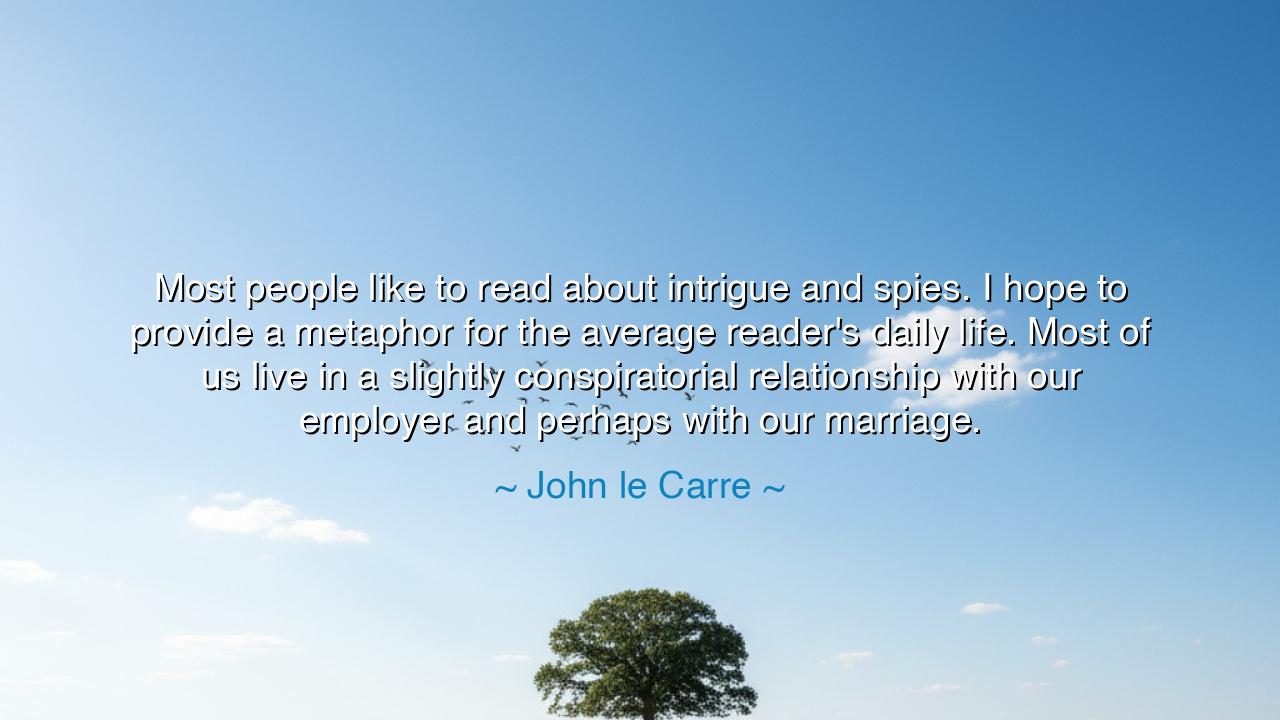
Most people like to read about intrigue and spies. I hope to
Most people like to read about intrigue and spies. I hope to provide a metaphor for the average reader's daily life. Most of us live in a slightly conspiratorial relationship with our employer and perhaps with our marriage.






In the penetrating and world-weary words of John le Carré, the master chronicler of shadowed loyalties and quiet betrayals, there lies a wisdom both unsettling and true: “Most people like to read about intrigue and spies. I hope to provide a metaphor for the average reader’s daily life. Most of us live in a slightly conspiratorial relationship with our employer and perhaps with our marriage.” Behind these calm and careful words is the voice of a man who understood that the world of espionage—the realm of secrets, double lives, and unspoken pacts—is not confined to the corridors of governments and intelligence agencies. It lives within the human condition itself. For every soul that hides a thought, a fear, or a resentment from another, there is a shadow of espionage at play.
The meaning of this quote runs deeper than its surface suggests. Le Carré does not speak only of spies and intelligence work; he speaks of the hidden negotiations that shape our existence. In the offices where we labor, we smile at superiors, conceal our true opinions, and maneuver through silent politics. In marriage, too, we may keep small secrets—half-truths meant to preserve peace, feelings we swallow to avoid conflict, ambitions we bury so as not to wound the one we love. Thus, he reveals the uncomfortable truth: that life itself is a series of delicate conspiracies, where sincerity and self-protection are constantly at war. His novels, filled with agents and traitors, are mirrors held up to the everyday theatre of human relationships.
The origin of this insight comes from le Carré’s own life—one lived between deception and truth. Before becoming one of the greatest novelists of the twentieth century, he served as a spy in MI5 and MI6, where duplicity was not a vice but a vocation. Yet it was his withdrawal from that secret world into writing that allowed him to see its greater metaphor. To him, the spy was not just an agent of politics but a symbol of the human soul in conflict—divided between loyalty and self-interest, honesty and survival. When he wrote of the weary spymaster George Smiley, he was writing of us all: the man or woman who tries to hold together truth and illusion, honor and necessity, in a world that demands both sincerity and disguise.
There is in le Carré’s thought an echo of the ancient philosophers, who taught that the self is a battlefield of appearances and essence. The Greek sage Heraclitus once said, “Character is destiny.” But character, as le Carré might have observed, is often tested in the unseen moments—those inner negotiations between what we show the world and what we truly feel. Even in the smallest workplace, or within the confines of a home, there exist layers of secrecy: ambitions concealed, emotions disguised, dreams deferred. Just as a spy navigates alliances and dangers, so too must the ordinary person navigate the labyrinth of human society, where every act of diplomacy—spoken or unspoken—is a quiet act of espionage.
A fitting historical reflection can be found in the life of Thomas More, the English statesman who served under King Henry VIII. More was a man of integrity in a court of intrigue, where survival demanded silence and subtlety. He smiled when he must, kept secrets when he had to, and played the dangerous game of diplomacy—until his conscience could bear it no longer. In the end, he chose truth over deception and paid with his life. His story, like le Carré’s characters, reminds us that to live in society is to dwell within a web of half-truths, but that there always comes a moment when one must choose whether to keep playing the game or to stand naked before the truth.
Le Carré’s quote is not cynical—it is illuminating. He does not condemn humanity for its conspiratorial nature; he merely holds a mirror to it. We hide because we must, and sometimes because we care. The diplomat lies to prevent war, the parent conceals fear to comfort a child, the worker pretends satisfaction to preserve livelihood. These small deceits, though imperfect, are part of the fragile art of coexistence. Yet his warning is clear: when our lives become too entangled in secrecy, when masks replace faces, we lose touch with our own integrity. The very conspiracies that protect us can also enslave us.
Therefore, O listener, take this lesson as both caution and wisdom: live truthfully where you can, and be conscious of the masks you must wear. Understand that a measure of secrecy is the price of civilization, but never let it become the measure of your soul. In your work, in your marriage, in all dealings of the heart—let your intentions remain pure, even when your words must be guarded. For in the end, as le Carré teaches through his art, the greatest espionage is not between nations, but between the self we show the world and the self we hide within.
And so remember the enduring wisdom of John le Carré: that intrigue and spies are but reflections of the human heart in its ceaseless dance between truth and concealment. Every day we move through a world of quiet conspiracies, but if we live with awareness and integrity, we may yet find peace amidst the masquerade. For it is not the absence of secrets that makes a person noble—it is the courage to remain honest in a world built on disguise.






AAdministratorAdministrator
Welcome, honored guests. Please leave a comment, we will respond soon